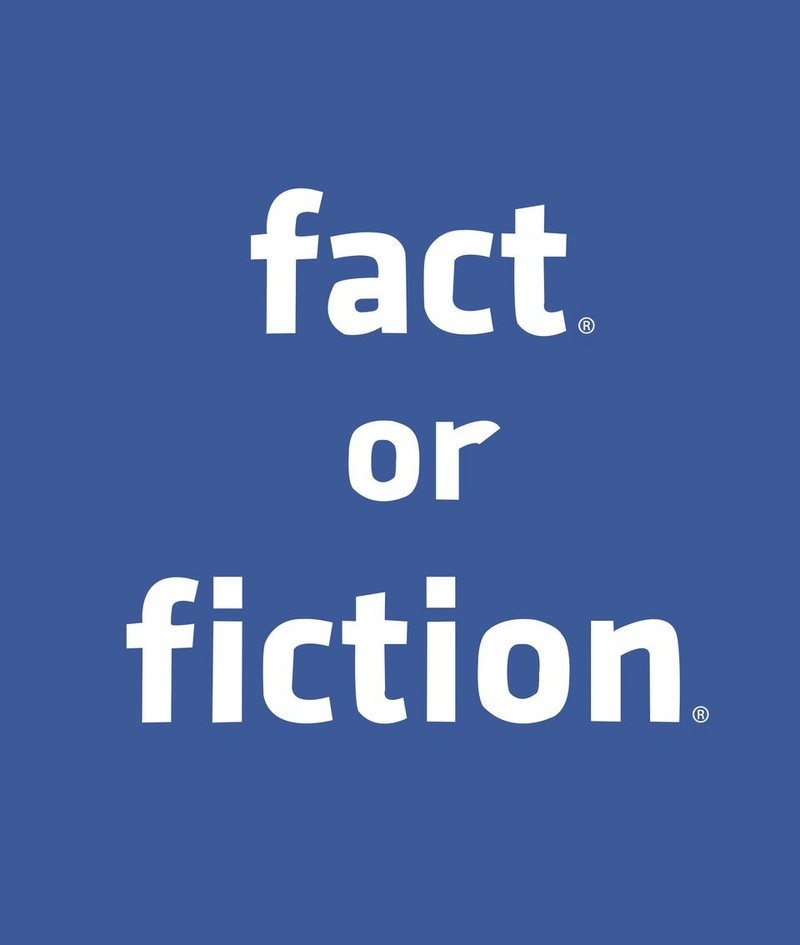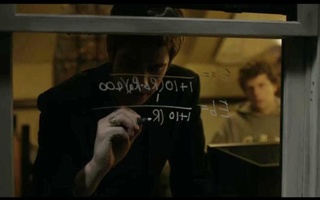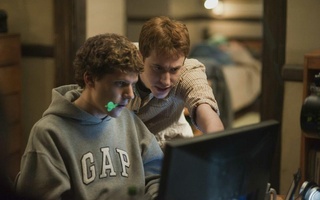“Who are you gonna send it to?”
“Just a couple of people. The question is, who are they gonna send it to?”
Thus begins a scene from the upcoming film “The Social Network,” which tells the story of the founding of Facebook, the now-ubiquitous social networking service, at Harvard in 2004. The scene in question involves a young Mark E. Zuckerberg, formerly of the class of 2006, and his friend Eduardo L. Saverin ’05. The two have just created Facemash.com—a hot-or-not rating website that offered Harvard students the opportunity to rank their peers by attractiveness—and sent out a link to some friends. After a rapid-fire montage of students gleefully ranking their friends and roommates, the Harvard network crashes from the amount of traffic it has generated.
“Unless this is a coincidence, I think this is us,” says Saverin.
“It’s not a coincidence,” Zuckerberg replies bluntly.
Following the short-lived Facemash, Zuckerberg’s next creation was a site all too familiar to us now—Facebook.com. Soon after launching the site from Kirkland House in February 2004, Zuckerberg took a leave of absence—from which he would never return—in order to work on the site. Months later, he was engaged in a federal copyright lawsuit. Cameron S.H. Winklevoss ’04, Tyler O.H. Winklevoss ’04, and Divya K. Narendra ’04 had founded a site called Harvard Connection (later to become ConnectU), and claimed that Zuckerberg had stolen the idea from them. Later, he was also sued by co-founder Saverin, who felt unfairly shut out of the company.
Unsurprisingly, Zuckerberg’s story turns out to be rich dramatic material. In a digital culture with a ravenous appetite for stories, this drama has already been taken, adapted, interpreted and rewritten at an alarming rate. Just as quickly as Facebook took off—it has garnered 500 million users in less than seven years of existence—so has its saga rapidly been subsumed into public discourse, inspiring several books and now a film. Last year, author Benjamin A. Mezrich ’91—a former Crimson cartoonist—published his own account of the events in a book entitled “The Accidental Billionaires.” Weeks after Mezrich had begun this project, his book proposal caught the eye of screenwriter Aaron Sorkin, creator of “The West Wing”. Sorkin, along with filmmaker David L. Fincher (“Fight Club,” “Zodiac”), has just completed work on “The Social Network,” a film that will share Facebook’s story with a national audience on October 1.
The upcoming premiere of “The Social Network” raises vital questions of the line between fiction and non-fiction. The book and the movie reveal a vast multiplicity of perspectives on the controversies surrounding the creation of Facebook. Mezrich and Sorkin insist that their works are non-fiction, despite Zuckerberg’s persistent refusal to provide his own first-hand account of the events. Likewise, despite Sorkin’s meticulous attention to detail, a Harvard audience might recognize that the film’s creators have taken certain liberties in its portrayal of campus life. Thus while Zuckerberg has been partial to the creation of a culture that usurps and corrupts stories beyond recognition, he himself is subject to the same kind of transformative forces.
“NOT ONE TRUE STORY”
“I consider the book entirely non-fiction,” Mezrich says. “The Accidental Billionaires” is a self-proclaimed “dramatic, narrative account based on dozens of interviews, hundreds of sources, and thousands of pages of documents.” The author accrued as many first-hand accounts as possible and undertook field research in and around Harvard campus. While his research was exhaustive, Mezrich’s method of writing non-fiction is decidedly non-traditional. He has attempted to reconstruct the Facebook story as a thrilling chronicle of true events embellished with literary elements like composed dialogue and figurative language.
Mezrich openly acknowledges that his mission is not wholly straightforward: he found himself challenged to construct a coherent story from conflicting perspectives. “We’re talking about something that happened a number of years ago. We’re talking about people who have vastly different memories of what happened during [a given] scene,” Mezrich says. “There are multiple ways to write that scene… For me, I’m describing the scene as I believe it looked based on the research.”
Though written in an omniscent third-person voice, much of the book specifically reflects the perspective of Saverin, Mezrich’s primary interview subject. “Eduardo I found a very compelling character,” he says. The author identified with the malcontent; “he’s a bit of a beaten-down puppy,” Mezrich says. Saverin’s openness gave him a privileged position in “The Accidental Billionaires;” “He’s kind of the main character of the book,” Mezrich says. Conversely, Zuckerberg’s reticence limited his own voice in the narrative. “I really tried not to write in Mark’s voice as much because it wouldn’t be fair to him,” the author says.
However, the absence of Zuckerberg’s perspective leads to a character that feels almost inhuman in comparison to the others. One of the final chapters of the book declares that, “Now, we can surmise, Facebook was the only true love of Mark’s world—the computer, that glowing screen in front of his face… Mark wouldn’t let anything, or anyone stand in the way of Facebook.”
Mezrich’s writing has been met with heavy criticism in the past. “I get attacked a lot by… old-world journalists,” he says. Literary critic Janet Maslin of the New York Times wrote in her review of the book, “‘The Accidental Billionaires’ is so obviously dramatized, so clearly unreliable that there’s no mistaking it for a serious document.”
Mezrich unapologetically admits that he writes with cinematic flair. “I get really, really bored by non-fiction,” he says. “I want to live vicariously through my stories. For me, I want to entertain and be entertained myself. I think it’s a very good way to tell a story.” Ultimately, though, he stands by his work, pointing out that there is a substantial amount of gray area surrounding the Facebook saga. “There’s really not one true story,” he says.
Read more in Arts
Margot & the Nuclear So and So’s Hit Growing Pains



















